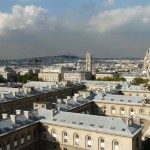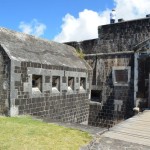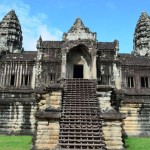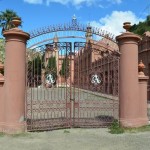
I was browsing internet and found a really cool infographics with 25 funny facts about the Eiffel Tower. Please feel free to check it out and learn something new:
Check out other three things you cannot miss in Paris.


I was browsing internet and found a really cool infographics with 25 funny facts about the Eiffel Tower. Please feel free to check it out and learn something new:
Check out other three things you cannot miss in Paris.

When taking the island tour around St. Kitts one of the must stops was the walk around Brimstone Hill Fortress.
1690 was the year of the fortress foundation. Then in 1965 the preservation of the fortress started. The fortress and the surrounding area became a national park in 1985. We got almost an hour to wander around and letting the Sun to burn our neck, nose and shoulders.
The Sun was really strong here on top of the hill. But the views were so worth it! Brimstone Hill Fortress on St. Kitts is definitely one of my favorite places on the island and I could walk around for hours going back in history and just breathing in the fresh hot air with breeze playing with my hair.

The Kingdom of Cambodia, as it is officially known, is found in Asia and bordered by the Gulf of Thailand, Vietnam, Laos and Thailand. With around 15 million citizens it is a moderately sized country that has seen a lot of changes of the years. A Buddhist country, it is best-known for Angkor Wat – a temple that attracts millions of backpacking and standard tourists each and every year.
The temples of Cambodia
Decades of civil war meant that just 12 years ago, the country was almost off the map of travellers. Today, you can’t move without seeing a foreigner and they’re all heading for the big temple, but there are dozens more. From Phnom Chissor in the capital with its beautiful views to Sambor Prei Kuk and the 140 monuments and temples of a 1,400 year old city to Koh Ker, the 10th century lost city, there is so much more to see. But, the largest religious monument in the world and arguable the most important archaeological site in South-East Asia will always rule supreme…
Angkor Wat
This World Heritage Site has history and romance in abundance – not to mention grandeur. Some say that it encompasses all the elements of a Pharaoh, the Pyramids and the Taj Mahal thanks to the luxury, impressiveness and beauty seen across the sprawling 500-acre site. Since opening in the 12th century it has always been a place of worship and was initially dedicated to Vishnu. It is believed that this sophisticated piece of architecture was created to be a replica of the universe.
A big question was how the stones used in its building were taken from the sacred Mount Kulen to the temple in such a short timeframe. The Khmer empire was supremely powerful in its day and used canals to aid transportation and there is a network of some 21 miles that connects the two and quarries en-route go to back up this claim.
Taking just 30 years to construct, it was King Suryavarman II who oversaw it and experts feel it was built to be a funerary temple for him. In terms of positioning, the west orientation would symbolise the setting sun – and, thus death – which supports this believe. We have all seen pictures of the area but the unrestored Ta Prohm is easily the most photographed temple here. Known to be one of the favourites is at the Bayon temple where a Bayeux Tapestry-esque tale tells a long story. Widely regarded as a trip of a lifetime the whole thing is enchanting.
Get going
Whether you are on a budget or looking for a stylish package, there are all manner of options to choose from. Try to get to the Angkor Wat early to see the sunrise.

I think that Castillo de la Glorieta is one of the places you should visit in Sucre, Bolivia. At least I mentioned it as one out of 12 things to do in Sucre.
The castle is open from Tuesdays to Sundays from 9 am to 4.30 pm. The entrance fee for foreigners is 20 Bolivianos with 10 Bolivianos if you want to take photos/videos. You can get there by a local bus number 4. The castle is situated just 5 kilometres from Sucre on the road to Potosi.
The Castillo de la Glorieta in Sucre was the home of Don Francisco de Argandoña and his wife Clotilde. It was built in the end of the 19th century (finished in 1897) in the eclectic style by the architect Antonio Camponovo together with and Argentinian architect. The castle is one of the most curious buildings from the republican period and mixes the styles, such as Gothic, Manierista, Baroque, Rococo, Neoclassical and Spanish Mudejar. It is one of the most important buildings that the husbands left behind and that reflects the places they visited in Europe.
The husbands were made Prince and Princess of the Glorieta in 1898 by the Pope Leon 13.
Castillo de la Glorieta was declared a ”National Monument” in 1970.
There are three towers in the castle: the English Gothic Church Tower reminds of London Big Ben, it’s 25 m tall and has 4 watches. The second tower is the one of the Princess Tower of Arab style and 30 m tall. The last tower is the tallest one – the Prince Tower (of Russian Byzantine style) which has 108 steps and is 40 m tall. I climbed it up and got a cool view of the surrounding areas and the military base outside the castle.
Apart from the towers, the garden and the chapel, there is not much to see inside the castle. The rooms are mostly empty, just some beautiful old mirrors and remains of the beds are there.
But from outside it is a very unique building because of the mixture of the styles. I am not sure if the castle is worth visiting from the inside as you have to pay, but definitely recommend you to see it from the outside at least. Castillo de la Glorieta in Sucre has also a lovely patio with a garden with palm trees.
Nowadays, Castillo de la Glorieta first owners – the Argandoña husbands are buried in one of the mausoleums of the cemetery in Sucre.
I am happy my plans changed completely when in Sucre I had to give Sucre – white city of the America a third chance. Only because of it I was able to visit Castillo de la Glorieta.